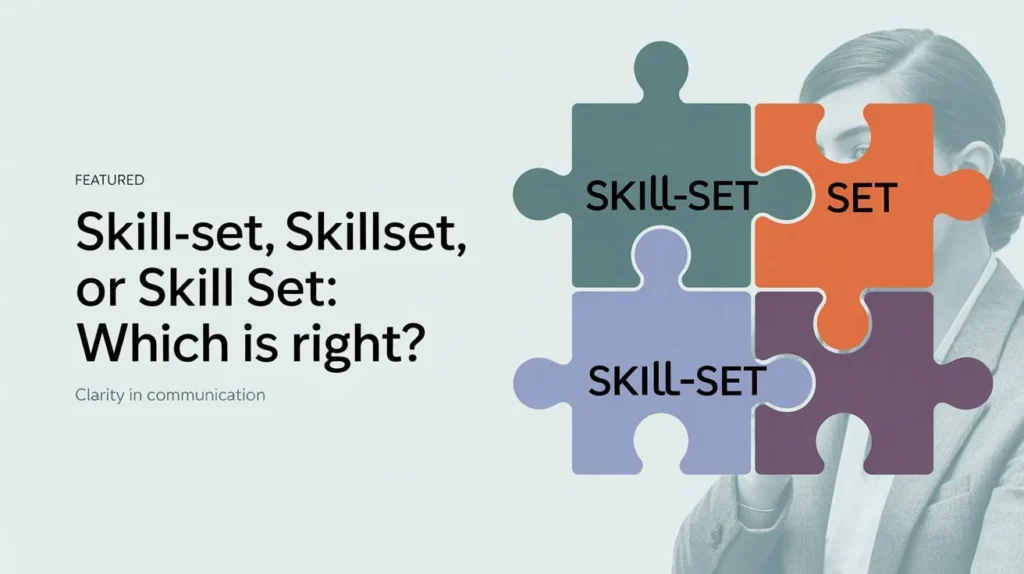Have you ever paused mid-sentence, wondering whether you should write skill-set, skillset, or skill set? You’re not alone. This small but tricky detail often trips up students, professionals, and even seasoned writers. The confusion comes from how English handles compound words. Sometimes they start as two separate words, later become hyphenated, and eventually collapse into one word. Think of email (once written as e-mail) or website (once web site).
The problem is that not every word follows the same path. Some compounds remain open, while others evolve and close over time. That’s where skill set causes headaches. You’ll see it written in different ways depending on where you look—résumés, job descriptions, online blogs, or corporate reports. But if you’re writing something important like a résumé or academic paper, choosing the correct form matters.
This article clears up the confusion once and for all. We’ll explore each variation, check what dictionaries and style guides say, trace the history of the term, and see how professionals use it in real life. By the end, you’ll know exactly which form of skill set is right for your writing—and you’ll have a few tips to avoid common mistakes in the future.
Breaking Down the Options
“Skill Set” (Two Words)
The most widely accepted form is skill set—two separate words. A skill set simply means a collection of abilities, competencies, or expertise areas. For example, a teacher may have a skill set that includes classroom management, lesson planning, and public speaking. A programmer’s skill set might include Python, database management, and software design.
Every major dictionary defines it as two words:
- Merriam-Webster: “a set of skills that someone has.”
- Oxford English Dictionary: “a person’s range of skills or abilities.”
- Cambridge Dictionary: “the range of things that someone is good at, especially things that are useful in a particular job.”
Notice that none of these list skillset or skill-set as the primary spelling.
In professional settings—especially résumés, cover letters, business reports, and academic writing—skill set is the only correct and safe choice.
“Skill-Set” (Hyphenated)
The hyphenated version, skill-set, shows up often because people mistakenly believe compound nouns always need a hyphen. But in this case, the hyphen is wrong.
Style guides are clear on this point:
- AP Stylebook: advises against unnecessary hyphenation unless it prevents confusion.
- Chicago Manual of Style: recommends writing it as two words.
- Oxford Style Guide: recognizes skill set without a hyphen.
Hyphens once played a larger role in connecting words, but modern usage tends to drop them as terms become familiar. That’s why we no longer write to-day or e-mail. With skill set, the hyphen never gained official acceptance. Using it in formal writing signals either an outdated style or a misunderstanding of grammar rules.
“Skillset” (One Word)
Now here’s where things get interesting. You’ll see skillset used widely online, especially in job postings, HR blogs, and tech industry articles. Many companies use it as shorthand, assuming it looks more modern and streamlined.
But the problem is acceptance. Most dictionaries still don’t list skillset as the standard. Instead, they recognize only skill set.
That said, usage is growing. A quick check on Google Ngram Viewer (which tracks word frequency in published texts) shows a steady rise in the use of skillset since the late 1990s. This mirrors the path of words like mindset and toolset, which are now closed compounds.
So while skillset isn’t wrong in informal writing, it’s still not standard in formal documents. If you’re applying for a job or submitting an academic paper, play it safe with skill set.
Grammar and Style Guide Authority
To remove any lingering doubt, let’s compare what major style guides and dictionaries say.
| Source | Accepted Form | Notes |
| Merriam-Webster | Skill set | Defines as “a set of skills that someone has.” |
| Oxford English Dictionary | Skill set | No listing for “skillset.” |
| Cambridge Dictionary | Skill set | Lists only the two-word form. |
| AP Stylebook | Skill set | Avoids hyphens unless clarity demands it. |
| Chicago Manual of Style | Skill set | Considers hyphen unnecessary. |
The verdict is unanimous: skill set is correct.
Historical and Linguistic Perspective
English loves to evolve. Compound words usually pass through three stages:
- Open compound (two words): e.g., cell phone, ice cream.
- Hyphenated compound: e.g., e-mail, check-up.
- Closed compound (one word): e.g., email, notebook.
The tricky part is that not every word completes this journey. For example:
- Mindset became one word.
- Skill set stayed as two words.
- Web site turned into website.
The reason often depends on how frequently the word is used and whether the hyphen helps avoid confusion. Skill set has remained stable as two words, possibly because “set” is already a complete noun and the phrase is easy to read without a hyphen or merger.
Google Ngram data shows skill set appearing in print from the mid-20th century, with skillset emerging only in the last few decades.
Professional Contexts: Which Form to Use?

Choosing the right form depends on who you’re writing for. Here’s a breakdown:
- Resumes and Cover Letters → Always use skill set. Hiring managers expect the standard form.
- Academic Papers and Research → Stick with skill set. Academic writing requires formal correctness.
- Business Reports and Presentations → Use skill set for credibility and clarity.
- Casual Blog Posts or Tech Articles → Skillset may be acceptable, but it’s better to maintain consistency.
Think of it this way: if your audience values professionalism or formality, don’t risk skillset.
Common Mistakes and Misconceptions
- Using “skill-set” → Incorrect. No style guide supports it.
- Autocorrect interference → Some software tries to merge skill set into skillset, creating bad habits.
- Industry jargon pressure → Tech companies and recruiters often push the one-word version, but that doesn’t make it correct.
- Confusing with mindset or toolset → Just because mindset is one word doesn’t mean skill set should be.
Practical Writing Tips
If you’re unsure which version to use, here’s a simple rule of thumb:
- Use skill set in any formal or professional context.
- Avoid skill-set entirely.
- Only use skillset if mimicking informal tone or quoting directly.
Correct Examples:
- “Her skill set includes project management, data analysis, and leadership.”
- “This role requires a diverse skill set in digital marketing.”
Incorrect Examples:
- “Her skill-set includes project management and data analysis.”
- “This role requires a diverse skillset in digital marketing.” (acceptable informally, not formally)
Related Terms and Variations
It helps to compare skill set with other compound words:
| Word | Accepted Form | Notes |
| Mindset | One word | Closed compound. |
| Tool set | Two words | Less common than toolset, but both appear. |
| Website | One word | Previously “web site.” |
| One word | Previously “e-mail.” |
This shows the inconsistency in English. Some compounds merge; others remain open. Skill set has resisted closure so far.
Final Answer: Which Is Correct?
To settle it clearly:
- Skill set → Correct and standard.
- Skillset → Increasingly common but still informal.
- Skill-set → Incorrect and outdated.
If you care about professionalism, stick to skill set.
Conclusion
The debate over skill-set, skillset, or skill set may seem minor, but small details like this shape how your writing is received. Readers—especially recruiters, employers, or professors—notice when words look off. Choosing the right form adds polish and credibility.
So here’s your takeaway: always write skill set in professional and academic contexts. Recognize that skillset may pop up in casual use, but avoid it when formality matters. And drop skill-set altogether—it’s simply wrong.
Language will keep evolving, and who knows? Skillset may eventually make its way into dictionaries as the standard form. But for now, you’re safest—and most correct—sticking with skill set.

Emma Brooke is a passionate English educator, writer, and language enthusiast with over a decade of experience helping learners master the nuances of the English language. At SynoEnglish, she blends practical grammar advice with real-world communication tips to make English easier, clearer, and more enjoyable for readers of all levels.



